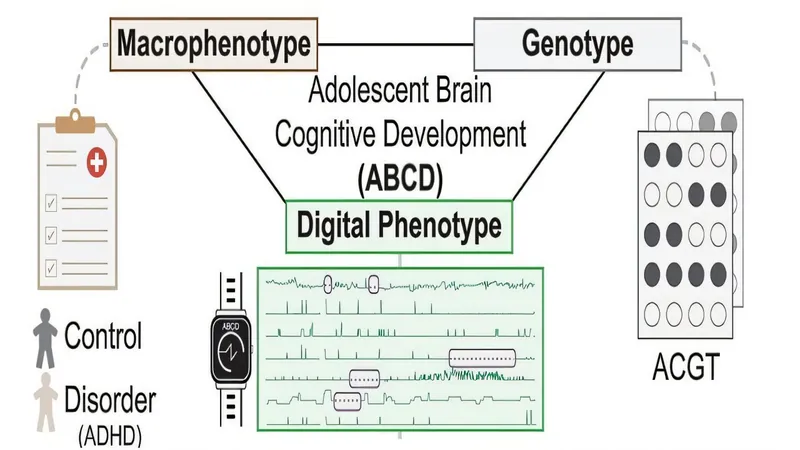
How Smartwatches Could Revolutionize the Understanding of Psychiatric Illnesses and Their Genetic Underpinnings
2025-01-20
Author: Wei
Introduction
In an exciting breakthrough for biomedicine, smartwatches that track users' physical and physiological data are being recognized as valuable tools for gaining insights into psychiatric disorders and their genetic links. A new study published in the prestigious journal *Cell*, co-authored by researchers from Yale University and the University of Barcelona, provides compelling evidence of this potential.
Research Overview
The research analyzed smartwatch data from over 5,000 adolescents aged 9 to 14 years, using this information to train artificial intelligence models aimed at predicting various psychiatric illnesses. Among the findings, significant associations were established between specific genes and certain mental health conditions, paving the way for a more nuanced understanding and treatment of these disorders.
Limitations of Traditional Psychiatry
Professor Mark Gerstein, an expert in biochemistry and data science, highlighted the limitations of traditional psychiatry, which often relies solely on subjective symptom assessments for diagnosis. "In this study, we spotlighted the power of wearable data to provide a clearer and more comprehensive prediction of psychiatric illnesses and their ties to genetic factors," he stated.
Methodology
The study utilized data from the Adolescent Brain Cognitive Development Study, the largest long-term investigation of brain development and child health in the U.S. The smartwatch data included metrics such as heart rate, calorie expenditure, physical activity intensity, step count, and sleep quality, revealing a wealth of information that was previously difficult to quantify.
Digital Phenotype
By processing this data into what they term a "digital phenotype," the researchers were able to use it as a kind of diagnostic tool. Co-lead author Jason Liu explained, "The digital phenotype allows us to bridge the gap between observable behaviors and their genetic underpinnings, potentially revolutionizing psychiatric diagnostics."
Key Findings
Key findings of the study revealed that heart rate was the most critical measure for predicting Attention Deficit Hyperactivity Disorder (ADHD), while sleep quality and its various stages were essential in detecting anxiety. With these insights, researchers believe that smartwatch data can illuminate the relationship between physical activity and mental health more effectively than traditional methods.
Potential for Targeted Treatments
Moreover, the research indicates that this digital approach may allow for differentiation among subtypes of psychiatric disorders. For instance, within ADHD, distinct forms may react differently to medications. "This opens the door for targeted treatments, which can be tailored to an individual's specific symptoms," added Beatrice Borsari, another co-lead author.
Genetic Factors
In their quest to understand how genetic factors play into smartwatch data, the research team identified 37 genes potentially associated with ADHD, showcasing the added value of continuous monitoring. Interestingly, while they found no genes directly linked to ADHD diagnosis, this highlights the necessity of a more refined approach to understanding psychiatric illnesses.
Conclusion
"The research connects the dots between psychiatric conditions, digital phenotypes, and genetic profiles, unveiling a promising avenue for deeper insights into mental health," remarked Walter Roberts, a co-senior author. Although the study primarily focused on ADHD and anxiety, the researchers anticipate that their methodology could be applied to a range of psychiatric and neurological conditions. With these findings, we may soon witness a paradigm shift from conventional diagnostic techniques to innovative, quantitative behavioral assessments that uncover the intricate relationship between our genes and our mental health. Will smartwatches be the key to unlocking the mysteries of the mind? Only time—and further research—will tell.


 Brasil (PT)
Brasil (PT)
 Canada (EN)
Canada (EN)
 Chile (ES)
Chile (ES)
 Česko (CS)
Česko (CS)
 대한민국 (KO)
대한민국 (KO)
 España (ES)
España (ES)
 France (FR)
France (FR)
 Hong Kong (EN)
Hong Kong (EN)
 Italia (IT)
Italia (IT)
 日本 (JA)
日本 (JA)
 Magyarország (HU)
Magyarország (HU)
 Norge (NO)
Norge (NO)
 Polska (PL)
Polska (PL)
 Schweiz (DE)
Schweiz (DE)
 Singapore (EN)
Singapore (EN)
 Sverige (SV)
Sverige (SV)
 Suomi (FI)
Suomi (FI)
 Türkiye (TR)
Türkiye (TR)
 الإمارات العربية المتحدة (AR)
الإمارات العربية المتحدة (AR)